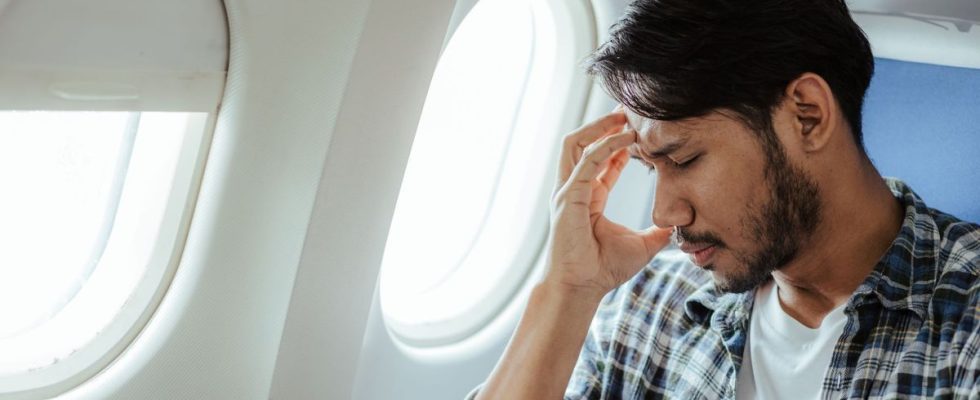Published on
Updated
Reading 2 min.
Have you ever noticed that you feel more bloated on a plane? How can we explain this phenomenon and is it possible to limit these gases, which can be annoying? Update on the subject.
Spending several hours on a plane affects our digestive system and promotes bloating. This can cause abdominal pain and embarrassing situations. Is it possible to avoid these gases? Expert advice from a gastroenterologist.
Gas during a plane trip, a normal thing
Firstly, this sensation is indeed real, as Dr. Melissa Hershman, gastroenterologist at Oregon Health and Science University, confirms to our colleagues at the New York Times.
“We always have gas in our digestive tract. We swallow air when we eat and drink and our gut bacteria also produce gas” she explains. “When a plane climbs and cabin pressure drops, this normal amount of gas expands, taking up more space in your stomach and intestines”.
Travel stress and anxiety can also play a role in this gas production, as can sitting for hours on a long-haul flight. “This doesn’t help“still approves of Dr. Hershman, because”usually, walking and other physical activities help the gastrointestinal tract function normally“.
Obviously, it is not possible to change the pressure or altitude of an aircraft. To avoid this bloating, you can still play with other parameters:
- Watch what you eat, by avoiding foods that usually cause gas from the day before your departure. This particularly concerns foods rich in FODMAPs, such as nuts, garlic, onion, wheat, certain fruits and certain dairy products…
- Drink enough because by avoiding the dehydration, you will also avoid potential constipation, which worsens bloating and gas. On the contrary, avoid alcohol, which has a dehydrating effect. For soft drinks, it depends on each person: they can increase the amount of gas, but can also sometimes relieve, by helping with burping, so you have to know yourself to know what is best for you;
- Use over-the-counter medications, which can help relieve bloating. If you know that you will be inconvenienced during a flight, you can anticipate and ask your pharmacist for advice to help you;
- Avoid chewing gumbecause they can help relieve the feeling of a blocked ear, but will cause you to swallow air, which may make your gas worse;
- Move during the flight : If possible, try to get up regularly during your trip, every hour on average. By taking a few steps, this will allow gas to circulate in your intestines, rather than stagnating;
- Breathe deeply : if you cannot get up, take deep breathing, which uses the diaphragm. To do this, inhale through your nose for four seconds, feeling your stomach expand. Then exhale through your mouth for six seconds. This will help reduce stress and relax your bowels;
- Relieve yourself and let go : if despite everything, if your stomach hurts a lot and you want to fart, do it, recommends the specialist. In fact, she reminds us that it is better not to hold back, at the risk of feeling worse. “Go to the bathroom, if you can. Otherwise, no one will hear you, due to the noise of the engines”. Before concluding on a reassuring note: “Trust me, you won’t be the only one doing this on a plane.”
